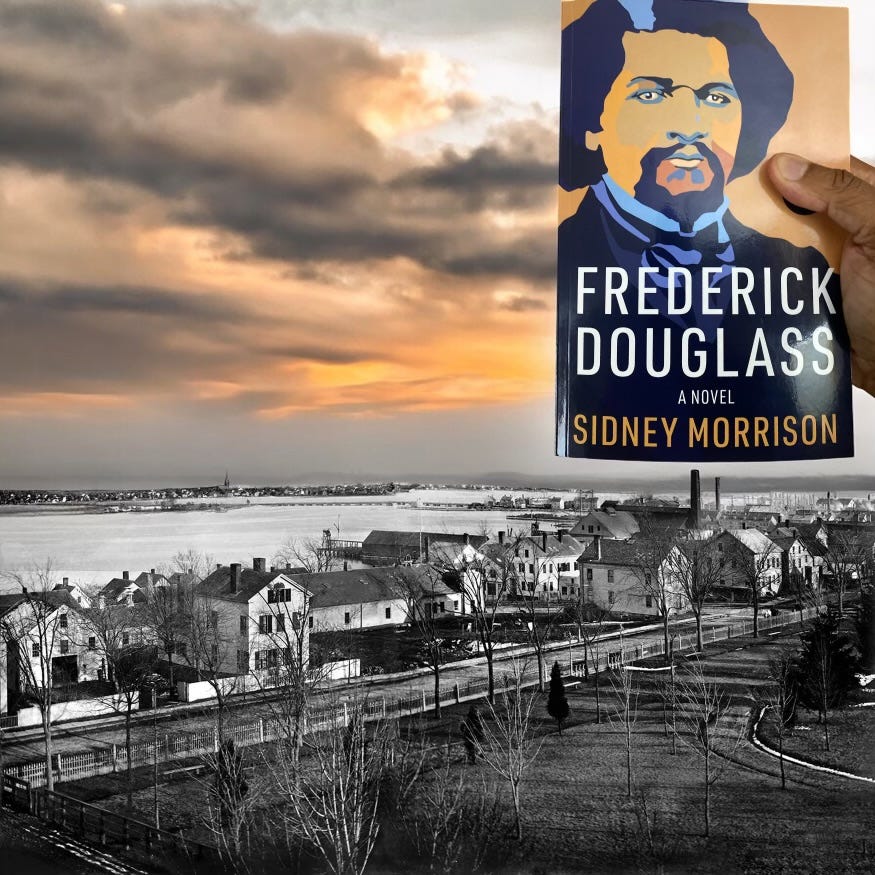When Frederick Douglass Arrived In New Bedford, Massachusetts
The City’s Historical Significance as a Fugitive Slave Safe Harbor
The much anticipated release of Frederick Douglass: A Novel on June 18 holds great significance in that it serves as the only historical novel published based on his life.
What makes this portrayal of Douglass unique are the details of his intimate life as well as his role as one of America’s founding fathers. He escaped slavery to become a radical abolitionist and proponent of racial equality
In the early stages of the book, there is mention of New Bedford, Massachusetts, a coastal city with a rich and varied history that stands as a testament to the resilience and progressive spirit that defined much of America's early development.
Renowned for its critical role in the whaling industry during the 19th century, New Bedford's historical evolution is equally marked by its commitment to social justice and its significant role in the Underground Railroad, providing a safe harbor for fugitive slaves seeking freedom.
The Whaling Capital of the World
In the early 19th century, New Bedford emerged as a global whaling hub. The city’s deep-water port and strategic location made it an ideal base for whaling ships. By mid-century, it had become the wealthiest city per capita in the United States, earning the moniker "The Whaling City." The whaling industry attracted a diverse population, including Quakers, who played a pivotal role in shaping the city's character and values.
A Haven for Abolitionists
The Quakers, with their strong anti-slavery stance, significantly influenced New Bedford's social landscape. Their beliefs in equality and humanitarianism permeated the city's ethos, fostering an environment where abolitionist sentiments could flourish. As a result, New Bedford became a magnet for both black and white abolitionists who worked tirelessly to undermine the institution of slavery.
The Underground Railroad and Fugitive Slaves
New Bedford's geographical location and its abolitionist residents made it a crucial stop on the Underground Railroad. The city offered fugitive slaves not just a stopover, but a community where they could rebuild their lives in safety and dignity.
It’s here where the prominent abolitionist Frederick Douglass and his wife Anna found refuge, a place where they were able to live and work freely. Douglass escaped from slavery in 1838 and the couple settled there on September 17th of that year.
Here, he found employment and began to participate in abolitionist activities. His time in New Bedford proved to be transformative for it was where he honed his oratory skills and began his illustrious career as an anti-slavery advocate.
Economic and Social Support for Freed Slaves
New Bedford's economy, buoyed by the whaling industry, provided ample opportunities for employment, allowing former slaves to achieve economic independence. The city's progressive stance on racial integration enabled African Americans to live, work, and socialize without the severe restrictions found elsewhere.
The New Bedford Union Society, established in the 1830s, was one of the earliest Black mutual aid societies in the country. It provided financial assistance and support to black residents, fostering a sense of community and mutual support among the city's Black population.
Legacy of Freedom
New Bedford's legacy as a safe harbor for fugitive slaves is commemorated in various ways throughout the city. The New Bedford Whaling Museum and the Nathan and Polly Johnson House, where Frederick Douglass first stayed upon his arrival, serve as reminders of the city's commitment to freedom and equality. These historical sites attract visitors from around the world, highlighting New Bedford’s pivotal role in the abolitionist movement.
Today, New Bedford honors its heritage through cultural events, educational programs, and preservation efforts that celebrate its history of social justice and inclusivity. The city continues to be a symbol of hope and freedom, reminding us of the enduring power of community and the importance of standing up against oppression.
In the end, New Bedford, Massachusetts, stands as a beacon of liberty and progress, its historical evolution deeply intertwined with the fight against slavery. From its days as the whaling capital of the world to its role as a safe harbor for fugitive slaves, New Bedford's story is one of resilience, courage, and unwavering commitment to justice.
The city's rich history serves as a powerful reminder of the impact that a community dedicated to equality and human rights can have on the broader tapestry of a nation’s history.
Join Our Community Today
As a supporting member of "Black Books, Black Minds," you'll dive deeper into a world where your reading passions around Black History thrive. For just $6 a month or $60 a year, you unlock exclusive access to a close-knit community eager to explore groundbreaking authors and books.
You won't just flip through pages; you'll engage in meaningful conversations, connect on a more profound level with fellow book lovers, and enjoy VIP discussions with bestselling authors.
Plus, you'll receive handpicked book recommendations tailored for you. This is your chance to be at the heart of a community where literature bridges souls and authors share their secrets, all thanks to your support.
So join us today. Your participation and support are welcomed and appreciated.






Among all people of all races Frederick Douglass was one of the greatest. It's good to know of a new book telling his story and that of the New England city that had so honorably prepared itself to meet him.